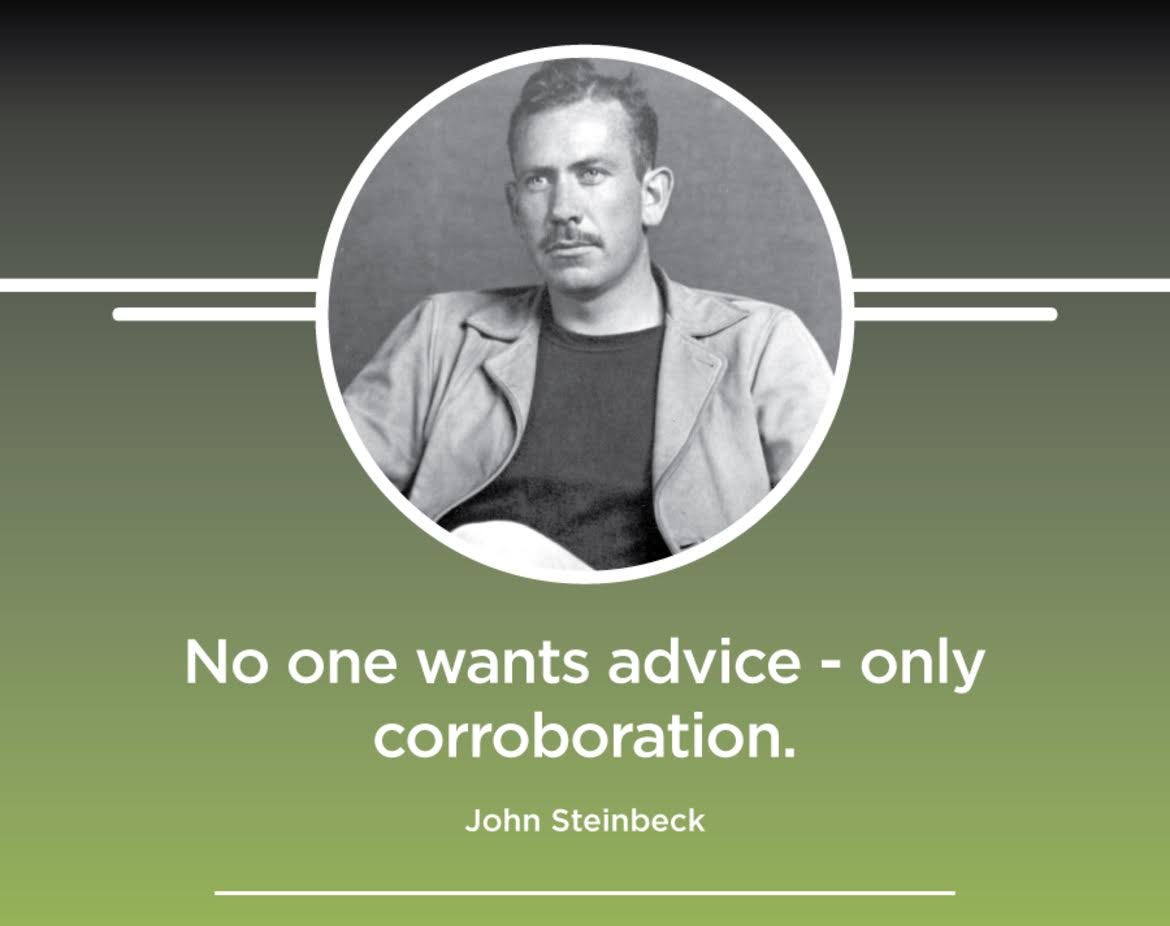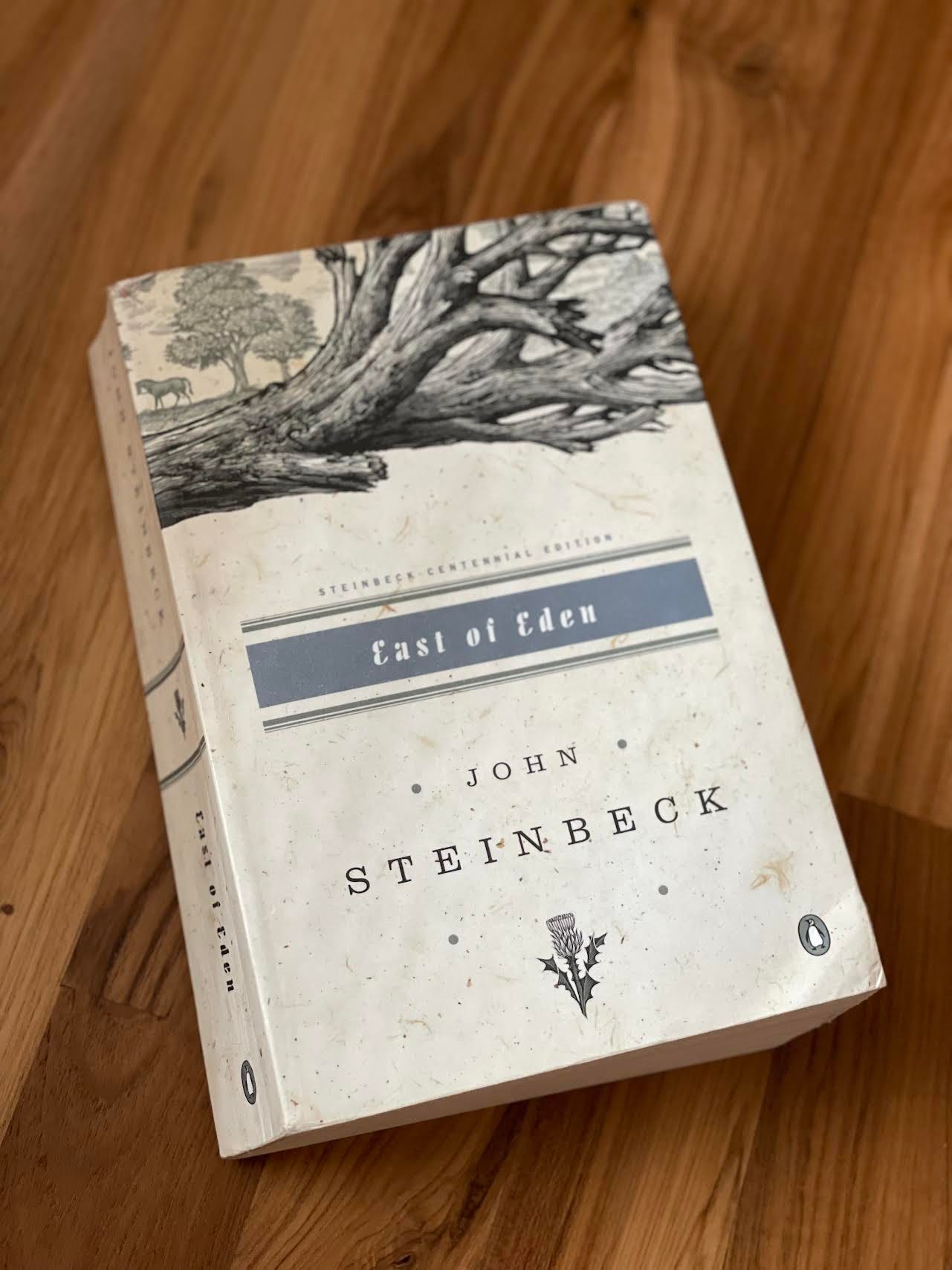I discovered Steinbeck some time ago as the author of my now all-time favorite quote -
I love that and think about it often when the advice monster begins to rear up, HA!
East of Eden has been on my shelf for a while now. I finally dusted it off last month after warming up by revisiting several other mid-century classics - Fahrenheit 451 and The Martian Chronicles by Ray Bradbury, The Man In The High Castle by Philip K. Dick, and Of Mice and Men by Steinbeck.
Sheesh, where to begin? This book is thick with themes, characters, and families that crisscross the nation. The story is set in the Salinas Valley, California, between the beginning of the twentieth century and the end of World War I.
First, Steinbeck is a master of making the banal, nearly invisible, simple rhythms of everyday life absolutely compelling. His execution of narrative and the human condition develops the characters with such clarity that you feel real emotion toward them, whether that be good, bad, or ugly. Pages are turning people!
And there is plenty of ugly here to be had as the story explores themes of depravity, truth, love, the struggle for acceptance and greatness, the capacity for self-destruction, guilt, and freedom. It ties these themes together with references to and many parallels with the biblical Book of Genesis (especially Genesis Chapter 4, the story of Cain and Abel).
Steinbeck's inspiration for the novel comes from the fourth chapter of Genesis, verses one through sixteen, which recounts the story of Cain and Abel. Steinbeck took the title, East of Eden, from Genesis, Chapter 4, verse 16: "And Cain went out from the presence of the Lord, and dwelt in the Land of Nod, on the east of Eden" (King James Version).
A fantastic fable as a retelling of the biblical tale of the original sin, a documented testimony of early settlers in the Salinas Valley through the perspective of three generations, a fictionalized biography of Steinbeck’s own grandfather (Samuel Hamilton), and The Trasks (Adam and Charles).
It begins at the turn of the century in Connecticut, telling about Adam Trask's difficult childhood and the troubles caused by his half-brother Charles. Adam eventually meets and marries Cathy Ames, whom he blindly falls in love with but who has a brilliantly composed, near-inhuman evilness around her that transfixes the reader throughout the story.
They move to the Salinas Valley in California, where they have twin sons, Aron and Cal, giving the Cain and Abel motif a second generation. Cathy has no feelings at all for her husband or sons and quickly abandons her young family. She runs off to secretly become a prostitute in a nearby town, adopting the name of Kate and creating an alternate persona that wishes nothing more than ultimate control and eternal damnation on the world and everyone in it.
Aron and Cal grow to be young men: Cal is wild and reckless, Aron dependable and good-hearted, always believing the best of others.
In addition, Steinbeck weaves in a storyline about the Hamilton family, who were Irish immigrants and Steinbeck's actual ancestors.
I enjoyed how Steinbeck humanized the “Cain” characters and emphasized how we all have a choice in how we behave and react to events in our lives.
Steinbeck defies dogmatic predeterminism by reconstructing the architecture of the human spirit with all its weaknesses and cruelties. By placing the responsibility for the actions on human beings instead of an almighty presence, he challenges the reader to call into question their own beliefs on fate, free will, truth, and guilt.
Hatred, revenge, self-doubts, and other misguided fears haunt the characters of this story, and they fight the effects of such visceral feelings with the only weapon our author approves of: Love.
This book is flatly a timeless monument to the tale of good and evil. And it is a monument.
Steinbeck himself said, "It has everything in it I have been able to learn about my craft or profession in all these years," and later said, "I think everything else I have written has been, in a sense, practice for this."
The possibility to choose, to pick this path or the other when we are at the crossroads, is the most precious gift we are given along with life. Love might make us fragile and defenseless, but it is the only way to reach the end of the journey without regret or remorse. Steinbeck exposes his high principles and allows the reader to decide for himself.
We cannot choose to be made a part of this mystifying place that we seldom understand, but we can practice goodwill and trust that others will do the same. Paradise may not exist, but Steinbeck posits that selflessly loving others is the path to save us from ourselves.
5 Stars
Thank you for reading!



